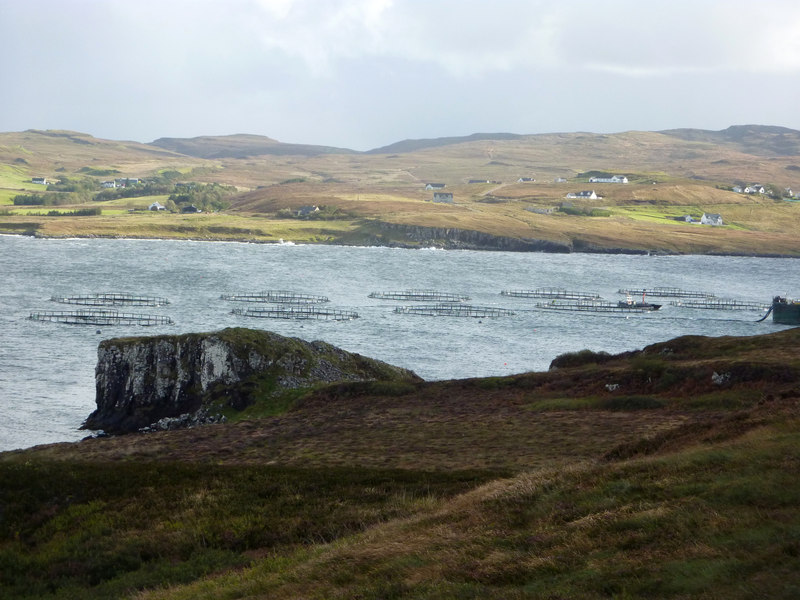One of the world’s largest fish farming companies has accidentally killed more than 175,000 of its caged salmon in Scotland while trying to treat them for lice and disease, according to internal government memos.
Blunders by Norwegian multinational, Marine Harvest, have cost millions of pounds and led to over 600 tonnes of salmon having to be incinerated. The losses have contributed to a 16 per cent drop in the company’s Scottish salmon production.
Campaigners have accused Marine Harvest of treating salmon cruelly, and warn that lice and diseases are “choking the Scottish salmon farming industry to death”. They mock plans to double the size of the industry by 2030 as “sheer lunacy”.
The worst incident took place in July and August on a salmon farm in Loch Greshornish on the Isle of Skye. Some 95,400 fish were killed by a new device called a thermolicer, which is designed to rid salmon of the sea lice that plague them.
But the way it does this – by suddenly immersing fish in water much warmer than they are used to – can also kill the fish themselves. What happened on Skye was explained in a memo on 12 September from government officials to the rural economy minister, Fergus Ewing.
The “sudden temperature change” caused by the thermolicer killed 95 per cent of the lice but also caused “significant mortalities” amongst the salmon, it said. Officials estimated that the losses cost Marine Harvest over £2.7 million.
“This report highlights the ongoing difficulties and costs faced by industry with regards to sea lice management,” concluded the memo, which was released under freedom of information law. Along with other documents about incidents at Marine Harvest fish farms, the memo is being published by The Ferret (see below).
Another 20,000 salmon were killed at Loch Greshornish fish farm by other attempts to rid them of sea lice using chemicals. There are concerns that lice are becoming increasingly resistant to chemical treatment.
In a second memo to Ewing on 26 September, officials revealed more inadvertent deaths, this time at a Marine Harvest fish farm in Soay Sound off the Isle of Harris. Earlier that month 60,000 salmon had been killed by hydrogen peroxide used to treat them for amoebic gill disease.
In the last few months Marine Harvest fish farms in the Hebrides and Wester Ross have suffered a series of outbreaks of gill disease. Hundreds of thousands of dead fish have reportedly been transported to Wigan, near Manchester, to be incinerated.
According to the company’s latest quarterly report to investors, its production of salmon in Scotland has dropped by 16 per cent since last year. Costs increased due to “incident based mortality” that was “mainly related to gill disease and sea-lice treatment losses”, the report said.
On 28 October the fish farming industry launched a plan to double its business from £1.8 billion this year to £3.6 billion by 2030. The plan was backed by Ewing, who promised to set up an “industry leadership group”.
But the ambition has been derided by anti-fish farm campaigners. “With lice infestation and gill diseases already plaguing salmon farming, this is sheer lunacy,” said Don Staniford, director of the Global Alliance Against Industrial Aquaculture.
It was Staniford who obtained the government memos revealing the accidental deaths. “That Marine Harvest is desperate enough to resort to a decidedly dodgy thermolicer shows how deep-rooted the industry’s disease problems are,” he said.
The animal welfare group, Compassion in World Farming, described the thermolicer as “a very brutal form of treatment which clearly causes distress and suffering to the fish”. It currently opposes its commercial use.
“Killing fish by overheating, whether accidental or not, is simply inhumane,” said the group’s chief executive, Philip Lymbery, “All current forms of treating sea lice entail problems.”
The Green MSP, Mark Ruskell MSP, has lodged a parliamentary question asking for a list of fish farming incidents over the last two years. He questioned whether the industry could double production “without disastrous consequences.”
Marine Harvest pointed out that the salmon killed in the “unfortunate” thermolicer incident had been weakened by gill disease. “We regret any loss of fish and are always mindful of the welfare of the fish and aim to continuously improve our methods to address changing environmental circumstances, “ said the company’s manager Steve Bracken.
“We have been dealing with a number of challenges in relation to fish health,” he added. “We have also faced challenges with amoebic gill disease which is increasing in this part of the world as a result of climate change.”
According to the Scottish Salmon Producers’ Organisation, “unexpected incidents” can happen with new treatment technology. “Any growth will be achieved responsibly and sustainably,” said chief executive Scott Landsburgh.
The Scottish Government welcomed new ways of dealing with sea lice that avoided the use of medicines. “Industry is undertaking research with a number of partners to improve the effectiveness of these innovative treatments and enhance their reliability so that they do not cause accidental killing of fish,” said a spokesperson.
Information released by the Scottish Government on incidents at Marine Harvest fish farms
Photo © Phil Champion and licensed for reuse under Creative Commons Licence.
A version of this article was published in the Sunday Herald on 6 November 2016.














